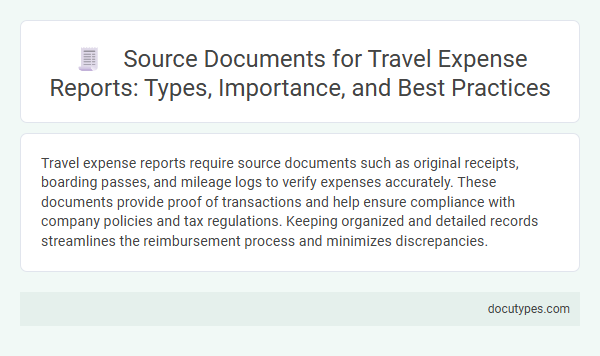Travel expense reports require source documents such as original receipts, boarding passes, and mileage logs to verify expenses accurately. These documents provide proof of transactions and help ensure compliance with company policies and tax regulations. Keeping organized and detailed records streamlines the reimbursement process and minimizes discrepancies.
Introduction to Source Documents in Travel Expense Reports
Source documents are essential for verifying travel expenses and ensuring accurate reimbursement. They provide detailed proof of costs incurred during business trips.
You must submit original receipts, invoices, or official statements as part of your travel expense report. These documents validate the expenses and support compliance with company policies.
Common Types of Source Documents for Travel Expenses
| Common Types of Source Documents for Travel Expenses |
|---|
| Receipts: Official receipts from hotels, restaurants, and transportation services are essential. These documents verify the amount spent and the date of the transaction. |
| Airline Tickets and Boarding Passes: Proof of travel includes electronic or paper tickets and boarding passes. These confirm travel dates, destinations, and fare details. |
| Hotel Invoices: Detailed invoices indicate the duration of stay, room rate, and additional charges such as taxes or services. These are necessary for lodging expense verification. |
| Transportation Receipts: Taxi, ride-sharing, rental car, or public transportation receipts document local travel expenses during the trip. |
| Expense Reports or Statements: If paying with a company card or reimbursed credit card, monthly statements showing relevant transactions must be included. |
| Itineraries: Travel itineraries outline the planned schedule, supporting the justification for claimed expenses. |
| Meal Receipts: Receipts from restaurants or food services validate meal expenses during travel periods. |
| You must provide clear and itemized source documents to ensure accurate processing and reimbursement of your travel expenses. |
Importance of Accurate Source Documentation
Accurate source documentation is essential for travel expense reports to ensure compliance with company policies and regulatory requirements. Receipts, invoices, and approved travel authorizations serve as primary source documents that validate the expenses claimed.
Maintaining precise records reduces the risk of reimbursement errors and audit discrepancies. You must submit original, itemized receipts to support each travel expense for timely and accurate processing of your report.
Receipts: The Primary Evidence for Travel Expenditures
Receipts serve as the primary evidence for travel expenditures when submitting travel expense reports. Proper documentation ensures accurate reimbursement and compliance with company policies.
- Receipts Validate Expenses - Receipts provide detailed proof of the amounts spent during travel, confirming the legitimacy of each expense.
- Receipts Support Budget Tracking - Collecting and organizing receipts allows accurate tracking against allocated travel budgets and financial records.
- Receipts Are Required for Audits - Auditors use receipts to verify expense claims and ensure adherence to internal controls and regulatory guidelines.
Credit Card Statements and Bank Records as Supporting Documents
Travel expense reports require accurate source documents to verify the legitimacy of reported expenses. Credit card statements and bank records serve as essential supporting documents to authenticate transactions related to travel costs.
- Credit Card Statements - These provide detailed listings of travel-related charges, including dates, merchants, and amounts, which help substantiate expense claims.
- Bank Records - Bank statements confirm payments made directly from personal or company accounts, supporting expenses not charged to credit cards.
- Documentation Verification - Both credit card statements and bank records must clearly correlate with itemized receipts or travel logs to ensure compliance with company policies.
Electronic vs. Paper Source Documents: Pros and Cons
Source documents for travel expense reports can be either electronic or paper-based, each offering distinct advantages and disadvantages. Electronic documents streamline processing, reduce errors, and enable faster approvals, while paper documents provide tangible backups and are sometimes required for compliance in specific cases. Your choice depends on organizational policies, ease of access, and the need for audit trails.
Best Practices for Collecting and Managing Travel Expense Documents
Source documents required for travel expense reports typically include receipts, invoices, and boarding passes to verify the expenses incurred. Best practices for collecting and managing these documents involve organizing receipts immediately after each expense and using digital tools or apps to capture and store copies securely. You should maintain clear, accurate records to ensure compliance with company policies and facilitate timely reimbursement.
Auditing and Compliance: Ensuring Validity of Source Documents
What source document is required for travel expense reports to ensure auditing and compliance? Receipts and invoices serve as primary evidence validating travel expenses. These documents must accurately reflect the expense details to maintain compliance with company policies and regulatory standards.
Common Challenges in Sourcing Travel Expense Documentation
Travel expense reports require accurate source documents such as receipts, invoices, and boarding passes to validate the incurred costs. These documents serve as proof of payment and are essential for reimbursement and auditing purposes.
Common challenges in sourcing travel expense documentation include lost or incomplete receipts, inconsistent formats, and delays in submission. Employees often misplace original documents or provide digital copies that lack necessary details. These issues complicate the verification process and can lead to delays or disputes in expense approval.
What Source Document Is Required for Travel Expense Reports? Infographic

